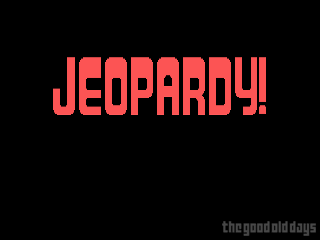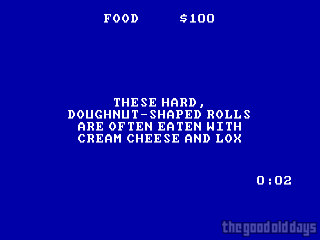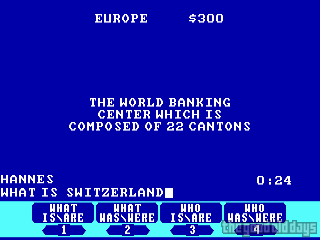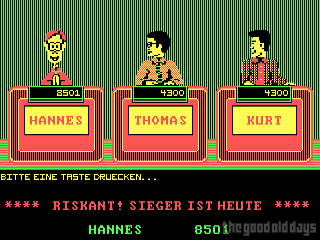Thoughts by Mr Creosote (15 Nov 2008) – PC (DOS)
Although some people (and especially the producers) may claim differently, Jeopardy! is actually one of the most straightforward quiz shows on TV. Nevermind that question-answer stuff – it’s still basically the same. Especially because most of the ‘answers’ aren’t really what you’d give as an answer if you were asked the respective ‘question’ (‘What is red?’ – ‘The colour of the stitchings of a major league Baseball game’… right, that’s how I’d define it, too). Basically, the three candidates are presented with a sort of ‘definition’, and they have to say what it is about.

The game pretty much makes away with the ridiculous ‘as a question’ by giving most of the sentence in advance. The players just have to fill in the actual term. But that’s not the only good choice the game makes to transfer it to the computer screen. The largest problem with these games is that the answers have to be given in free form, i.e. the player has to type something in. A classic point of failure – multiple choice translates more easily. What, if the player obviously knows the answer, but uses a synonym, a different spelling or something like that? No problem in a real quiz show where the answer is given orally and to human beings who can interpret. A huge problem if the answer is given to a machine which can’t think.
This problem will never be solved completely, but in Jeopardy!, it’s not really all that bad. Even if the game actually expects the answer ‘F.D.R.’, it will also accept ‘Roosevelt’, and when it’s looking for ‘Cerberus’, entering ‘Kerberos’ will get you the points as well. Obviously, a lot of work has been put into building up not just the question database, but also into providing lots and lots of alternative answers. Talking about questions (sorry: answers, of course), they’re quite varied and don’t repeat themselves quickly, which is always good to see. Mostly, they’re to the point and don’t allow for that much interpretation or completely different answers.
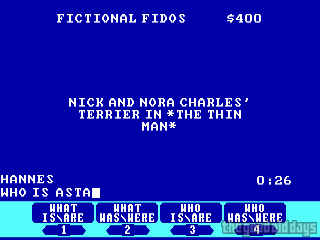
The game is, of course, played best with two other human players, but the computer opponents do provide surprisingly adequate competition as well. This is where the two language versions (the German version is called Riskant – the TV show only ran under the original title from the mid-90s here) differ quite a bit, actually. In the German version, I pretty much always win by a sizable margin, in the English version, I have a very tough time. There are two reasons for this.
First, a technical one: In the English version, the computer players often ‘buzz in’ so quickly that there isn’t even time to read the ‘answer’ properly! Sorry, but one second isn’t enough – so even if you know the ‘question’, you won’t have a chance to give it, because a computer opponent has already done so. This has nothing to do with fast computers, by the way, and the game apparently uses the computers clock instead of CPU cycles for any time-critical routines (smart move). In the German version, this never happens – you always have the time to read and understand everything before the computer acts.

The second reason is a matter of cultural background, of course. The questions in both versions are completely different ones (thankfully). And while I may be quite proficient at German / European literature, music and whatever else the German version of the game throws at me, I have a hard to answering questions about specific landmarks found in San Francisco or about people associated with Baseball. It’ll obviously be the other way round for other people, but it’s always something to keep in mind (not just for this particular game, but it’s basically a valid question for any quiz type game).
Graphics and sound are, unfortunately, quite tacky. This is a CGA game, so be prepared for ugly colours. In fact, the game looks pretty much like a typical result of a total beginner playing around with the drawing functions of Quick Basic 4 (believe me, I’m experienced when it comes to this). Sound is restricted to a few blips and blops from the PC speaker which can’t even be disabled (aaargh!).
Then again, this is not what this game is about. It’s a quiz game testing your trivia knowledge, and in this (admittedly) small genre, it’s one of the best, and one of the very few which make even sense to play on your own.


